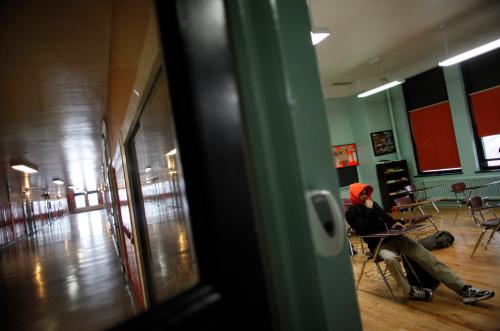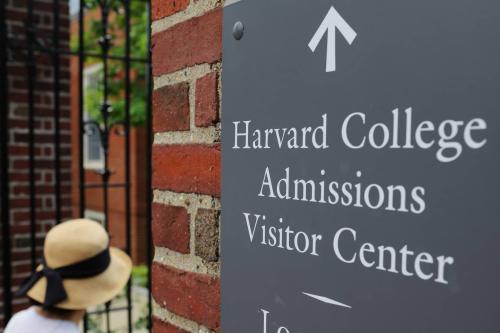One of the most enduring blind spots in U.S. educational outcomes is the implementation of policies and approaches that support excellence for Black boys both within and outside of schools. Although outcomes frequently do not reflect the ongoing advocacy for supporting the achievements of Black boys, for over five decades, there has been a continued, impassioned, and innovative conversation on how to ensure that Black boys achieve successful outcomes with regularity and in high numbers. Yet, the proposed approaches are rarely implemented with the accountability, consistency, and breadth necessary to promote excellence for Black boys.
In fact, data demonstrates that Black boys are disproportionally suspended from school, less likely to be in classrooms where teachers set high expectations, more likely to be involved with the criminal justice system for normal, age-appropriate behavior than their white peers, and less likely to be enrolled in gifted and talented programs than their white peers. Because of endemic, anti-Black male racism, Black boys are among the most marginalized groups of children in the U.S.
Black boys do achieve excellence, however, and are more likely to do so in places that create a culture of care for them. In the school setting, this culture of care is often crafted with intentionality: in the selection and display of images of other high achieving Black men throughout the school, positive words of affirmation, strong student-teacher connections and efforts by schools to build relationships with families.
We know from previous research by Raj Chetty that Black boys do best in places with lower poverty levels, lower levels of discrimination, and high rates of fathers in a community. These observations led us to ask, what does a culture of care for Black boys look like?
On October 31, 2022, the Race, Prosperity, and Inclusion Initiative hosted a conversation with Dr. Julius Davis and Dr. Tyrone Howard, two highly regarded educational experts to discuss what characterizes an intentional culture of care for Black boys and how we can ensure that a culture of care for Black boys becomes a standard approach to uncovering and supporting excellence and success for them.
Both Dr. Davis and Dr. Howard have written extensively on why we need an intentional focus on Black boys, particularly in the educational space. School codes of conduct, achievement standards, the demographic profiles of most teachers, and the cultural references of the materials are centered around white middle class experiences. The cultural dissonance with the range of experiences of Black boys means that schools, are, almost by definition, places that affirm and center whiteness and exclude other experiences.
The impact of so fully centering whiteness in school settings is that teachers, administrators, and other students view Black boys’ experiences as inconsistent with what constitutes accepted referents for academic achievement, and relational and learning modalities. That type of othering implicitly or explicitly dismisses Black boys as irrelevant to the world of academic achievement.
For that reason, defining a culture of care for Black boys must start with the acknowledgment of racism in the school setting, the undoing of approaches, reference points, and values that are exclusionary. In order to create a culture of care for Black boys, administrators, school districts, and state boards of education must develop extensive training and must encourage direct discussions about the effects of racism on Black boys.
Beyond that initial step, Dr. Davis and Dr. Howard emphasized that there are six additional elements to creating a culture of success for Black boys. First, it is important that Black boys are enrolled in quality pre-school programs with culturally competent teachers. There is ample evidence that quality pre-school positions allow students for future academic success.
The cultural dissonance with the range of experiences of Black boys means that schools, are, almost by definition, places that affirm and center whiteness and exclude other experiences.
Second, it is critical that teachers and administrators ensure that Black boys master reading by the third grade because it has been demonstrated that students who do not master literacy by the then do not have the foundation upon which to succeed in future educational opportunities.
Third, schools and school districts have to adopt the same level of tolerance for age-appropriate juvenile mistakes that they accord to white boys. As a result, school disciplinary activities and policies have to be overhauled to connect with Black boys and to support them, rather than resort to current widespread practices of suspending them for infractions.
Fourth, teachers and administrators should consistently set high expectations for Black boys. Too frequently, teachers and administrators do not expect Black boys to be successful in school or other educational settings and as a result, do not expend the resources nor create the relationships that provide academically challenging and supported opportunities to encourage Black boys’ engagement and sense of curiosity. That effort for expecting excellence has toinclude explicit, thoughtful, and consistently intentional methods for normalizing and including the experiences of Black boys, and other Black people in activities, discussions, materials, and exemplars.
Fifth, teachers and administrators have to intervene early on and frequently to ensure that Black boys are being recognized for their academic achievements. If done early and consistently enough, that recognition creates Black boys’ self-perception that they are successful, and that particular self-perception is important for future success.
Finally, a culture of care for Black boys encourages the entire community, not just the educational community, to be responsible for the physical, social, and emotional well-being of Black boys. That frequently means that schools must engage parents and guardians as co-equal partners in ensuring excellence for Black boys and that, in turn, means schools must be effective at engaging the parents of Black boys in ways that are both respectful and affirming.
The combined effect of these approaches, if implemented intentionally and consistently across the country, could have a dramatic effect in supporting the aspirations and potential of millions of Black boys in the United States.






Commentary
Defining a culture of care for Black boys
Monday, October 31, 2022